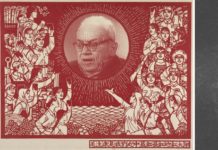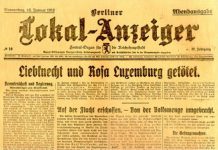
Socialistisk Biblioteks Tidslinje med links til begivenheder og personer i 1926.
Se også Index over personer, organisationer/partier og værker (som bøger, malerier, mm.), steder, begivenheder, mv., der er omtalt på hele Tidslinjen, titler og indhold på emnelisterne osv.
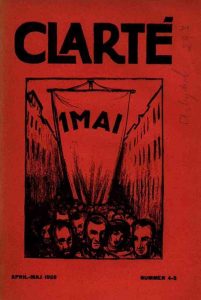
Bladliste 1926
Nye blade:
Clarté. Red. Anton Hansen.
Kritisk Revy. Ansv. Poul Henningsen. Red. Edvard Heiberg mfl.**
“I tidsskriftet Kritisk Revy fandt mange [af de venstreintellektuelle] et åndehul.. Tidsskriftets budskab lød: “Vi tror på en kunst af menneskeligt indhold, kunsten for samfundets skyld. ” Navnligt Socialdemokraterne måtte stå for skud.De beskyldtes for”kun at drømme om den mulighed at løfte hele arbejderklassen op i bourgeoisiets levemåde”. Det gik især løs på den anvendte kunst inden for arkitektur og kunstindustri og sluttede sig til funktionalismen.. Bladet vende sig mod den rene underholdning og krævede, at også scenens kunst forholdt sig til samfundet.
” … blev de toneangivende venstreintellektuelles centrale tidsskrift i mellemkrigstiden.. Da det ophørte gik nogle af dets medarbejdere til det rent marxistisk Plan”. (citat Tage Kårsted, Gyldendals og Politikens Danmarkshistorie, bd. 13, side 69.
Lanternen. Udgivet af sømandsafdelingen under DKP.
Sidste Time. Satirisk dagblad.
Se også på Socialistisk Bibliotek:
Arbejderhistorisk Bladliste, under året 1926 og nedenfor januar og 1. juli.
+ De kulturradikale tidsskrifter. af Morten Thing (indskannet tekst).
Januar 1926
Første nummer af det danske socialistiske kulturtidsskrift Clarté udkommer (januar 1926 – nr. 10-12, okt./dec. 1927).
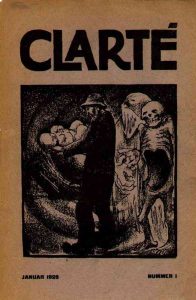
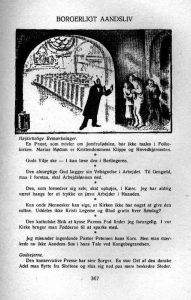
Se:
Clarté 1926-1927 (Danske Kulturtidsskrifter 1917-45. Red.: Det Kongelige Bibliotek).[nu online på WayBackMachine]
21. januar 1926
Italienske kommunisters III kongres i Lyon (Frankrig) 21.-26. januar betyder nederlag for venstrekommunismen (generealsekretær Bordiga), at Antonio Gramsci bliver leder, og vedtagelsen af de såkaldte Lyon-teser.
Se:
- Gramsci, Antonio (Leksikon.org).
- Bordiga, Amadio (Leksikon.org).
- Draft theses for the 3rd Congress of the Communist Party of Italy presented by the Left (The Lyons Theses, 1926) (Marxists Internet Archive)
The conflict between Gramsci and Bordiga in the early days of the Italian Communist Party, and the Lyon Theses. By Roberto Sarti (In Defence of Marxism,
Se også på Modkraft Biblioteket:
Personlisten Antonio Gramsci (1891-1937)
18. februar 1926
Den samfundskritiske og progressive lyriker og oversætteren af store udenlandske digtere digtere, Ivan Malinowski (før 1980: Malinovski), fødes i København. (Dør 5. november 1989). Gravsted: Askefællesgrav (“ukendtes grav”) på Afd. L , Assistens Kirkegård
Gendigtede Internationale i 1978 “Til kamp, fortabte kammerater” (Se Denstoredanske.dk) og nr. II udgave af Internationale (tekster) (fra Sangbog.revo.dk).
Leksika:
Ivan Malinowski (Wikipedia.dk). Kortfattet leksikonartikel.
Ivan Malinowski (Denstoredanske.dk).
Ivan Malinowski (Bibliografi.dk: international forfatterbibliografi).
De splittede lemmer- Ivan Malinowski. Af Lars Handesten (Dansk Litteraturs Historie, Gyldendal, 2007, bd. 5, side 74-76)
Forfulgte i alle lande!
Når I flygter for livet,
gå uden om Danmark,
det er mit råd.
Her i mit land,
som er en oase,
et smørhul og et kødbjerg,
hersker stenhjerter.
Loven er lovende
og justitsministeren
ikke en hvem som helst
men en dannet mand,
han kan fremmedord som asyl,
og humanitet, men
de er og bliver
fremmede i hans mund.
Litteratur:
Når vejskiltene er vendt : Digte. Samlet og med indledning Carl Erik Bay og Erik Stinus (Borgen, 2006, 124 sider).
Anmeldelser:
Malinowski revisited. Af Ulf Joel Jensen (Sentura, 30.3.2006). Med tekster fra bogen af efterladte digte: “seriøst umoderne i sin politiske digtning, sin insisteren på den socialistiske idé, sit internationale, solidariske sigte … et glimt af en forfatter, vi ikke må glemme.”
Malinowskis eksistentielle udpost : Ikke bogførte digte af Ivan Malinowski samlet og udgivet. Af Torben Brostrøm (Information, 25. juli 2007).
Fuga m. illustrationer af Dea Trier Mørch (Vindrose, 1885, 70 sider)
Omtale: Digtsamlingen FUGA – et samarbejde mellem Ivan Malinowski og Dea Trier Mørch. Af Bruno Svindborg (Fund og Forskning, Bind 28, 1988).
Se også på Socialistisk Bibliotek:
Tidslinjen 30. juni 1871 Om Internationale og oversættelser
22. februar 1926
Den norske venstrefløjspolitiker og SF-stifter Finn Gustavsen fødes i Drammen (dør 20. juli 2005).
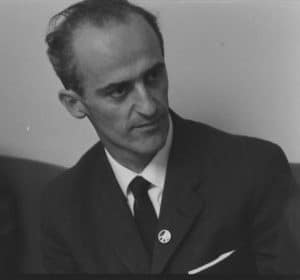
Se:
Gustavsen, Finn (Leksikon.org)
Finn Gustavsen (Wikipedia.no)
En samtale med Finn Gustavsen (Vardøger, nr. 23, 1996, side 42-49). Intervju af Anders Todal Jenssen: “Vi kan ikke nærme oss et Arbeiderparti som ikke nærmer seg oss. Det var dette som lå til grunn for vedtaket om at vi kunne samarbeide med et radikalisert Arbeiderparti …”
Kjell og Finn ser tilbake (Ny Tid, 24. januar 2003).
5. marts 1926
Medstifteren af Danmarks Kommunistiske Parti og redaktør af Arbejderbladet, Johannes Erwig, dør (Født 25. januar 1891).
Se på Socialistisk Bibliotek:
Erwig, Johannes (Socialister på Assistens Kirkegård).
26. marts 1926
Højskolemanden, samfundsdebattør og litteraturforsker (især om Georg Brandes) Jørgen Knudsen fødes. (Dør 1. september 2017, se denne)
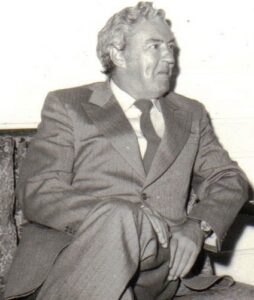
12. april 1926
Knud Jespersen fødes (dør 2.12.1977), efterfulgte Aksel Larsen som formand for Danmarks Kommunistiske Parti (DKP), fra 1958-1977.
Se:
Jespersen, Knud (Leksikon.org).
Knud Jespersen. Af Gert Petersen (Dansk Biografisk Leksikon). “K.J.s personlighed var en af (grundene til DKPs tilbagevenden til folketinget dec. 1973)* … han var ingen ‘fornyer’ – på godt og ondt forblev han sin opvækst tro …”
*DKP var ude af folketinget efter 1960, og igen efter 1979.
Litteratur:
Knud Jespersen: Knud Jespersen – en af arbejderklassens sønner : Udvalgte taler og artikler. (Tiden, 1979, 382 sider). Red. af Ib Nørlund mfl. Selvbiografi, side 13-89. “Hans største og sværeste arbejdsopgave var nok genrejsningen af det komunistiske parti efter de forsøg på at få det brudt ned … fra et hold, hvor man ikke skulle vente det..” Ib Nørlund, forord, s. 7-10.
28. april 1926
Forfatteren til den moderne amerikanske klassiker, den antiracistiske roman To Kill a Mockingbird (1960) (på dansk 1962: Dræb ikke en sangfugl), fødes i Monroeville, Alabama. Bogen blev filmatiseret 1963 (dansk visning, oktober 1963). Og som i 2015 blev fulgt op af bogen Go Set a Watchman/Sæt en vagtpost ud. (Dør i Monroeville, Alabama 19. februar 2016).
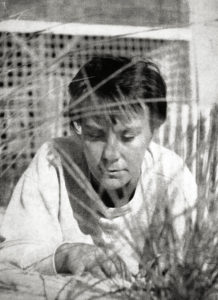
Se:
Harper Lee (Wikipedia.dk). Og længere artikel på engelsk.
In defense of To Kill a Mockingbird: The 1962 film about racism in theaters this week. By Joanne Laurier and David Walsh (World Socialist Web Site, 28 March 2019). “None of the effort or artistry, or courage, that went into To Kill a Mockingbird, however, satisfies or even concerns our present-day identity politics know-it-alls. Mulligan’s film now elicits a generally hostile response from the media.”
Minnesota school district removes To Kill a Mockingbird and Huckleberry Finn from the curriculum. By Sandy English (World Socialist Web Site, 14 February 2018). “The decision was made by a group of ‘district leaders and leaders in Duluth’s secondary schools’, after complaints by parents and students. Apparently, teachers were not consulted and only heard the news last week.”
Mississippi school district removes To Kill a Mockingbird from curriculum. By Sandy English (World Socialist Web Site, 24 October 2017). “The action was taken because of complaints from parents about racist terms in the book, used for entirely legitimate and artistically valid purposes.”
Harper Lee’s discarded leftovers. By Joe Auciello (Socialist Action, January 28, 2016). “Go Set a Watchman was a failed effort, but it contained the seeds of a better one.”
Who was Atticus Finch really? (SocialistWorker.org, July 29, 2015). “ explores the tumultuous debate that accompanied the release of Harper Lee’s long-awaited second novel Go Set a Watchman.”
Go Set a Watchman. By Kate Hurford (Socialist Review, Issue 405, September 2015). “Go Set a Watchman was never intended as the sequel to To Kill a Mockingbird so those who read it as such will be disappointed.”
Harper Lee’s Go Set a Watchman: More of a moneymaking than a literay event? By Sandy English (World Socialist Web Site, 3 August 2015). “While literary researchers, critics and biographers will no doubt benefit, the novel has been marketed by a publishing conglomerate under false and opportunist pretenses and adds little to our understanding of the period, the place … or the individual who stands on principle.”
Go Set A Watchman finds limits to some people’s anti-racism. By Sarah Ensor (Socialist Worker, Issue 2463, 21 July 2015). “Fifty years after anti-racist classic To Kill A Mockingbird, Harper Lee’s characters reappear in the unsettling Go Set A Watchman.”
A novel of the civil rights struggle (SocialistWorker.org, August 5, 2010). “Fifty years after its publication, takes a look at what Harper Lee’s classic novel To Kill a Mockingbird has to say about racism.”
Se også:
To Kill a Mockingbird (film) (Wikipedia.org). Movie info, trailer, pictures etc. på IMDb.
Se også på Socialistisk Bibliotek:
Tidslinjen: 30. september 1924, om hende tætte forfatterven Truman Capote.
3.-12. maj 1926
Den engelske 9 dages generalstrejke, “Days of Hope”. Ledelsen af landsorganisationen TUC bøjer af over for regeringens kompromisløshed og ønsket om alliance med venstrefløjen i Labour (TUC-ledelsen), og generalstrejken bliver et knusende nederlag.
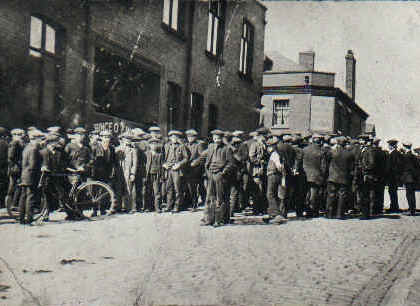
Se:
The General Strike of 1926 (Marxists Internet Archive; History Archive: The General Strike).
Communist Party of Great Britain: The General Strike: May 3-12, 1926 (Marxists Internet Archive; History Archive: CPGB).
The General Strike (Spartacus Educational).
UK General Strike of 1926 (Wikipedia.org). With links.
Bookwatch: The General Strike. By Martin Smith (International Socialism, Issue 70, Spring 1996, p.155-164).
Video: Lessons of 1926 General Strike. Tony Benn & Duncan Hallas at Marxism 1996 (Histomat, February 20, 2013).
Britain: communists, trade unions, and the Anglo-Russian Committee (In Defence of Matxism, 2 September 2022). “On 4 May 1926 a general strike began in Britain. But after nine inspiring days, the strike was betrayed by the trade union leaders, who were given a left cover by the Stalinists. Ben Gliniecki examines the lessons of these events.”
The fight last time: Lessons of the 1926 General Strike. By Sean Ledwith (Counterfire,
Nine days that shaped the words. By Bob Light (International Socialism, Issue 151, Summer 2016, p.208-210). Review of Charles Ferrall and Dougal McNeill, Writing the 1926 General Strike: Literature, Culture, Politics (Cambridge University Press, 2015, 236 p.).
90 years since the British General Strike: The lessons for today. By James Kilby (In Defence of Marxism, 4 May 2016)
Stalin, Trotsky and the 1926 British general strike, Part 1-3. By Chris Marsden (World Socialist Web Site, 30 December 2008).
80 years since the general strike: from world war to councils of actions. By Jack Conrad (Weekly Worker, Issue 623, May 4 2006).
Days of black and red. By Jack Conrad (Weekly Worker, Issue 624, May 11 2006).
A study in bureaucratic inertia. By Jack Conrad (Weekly Worker, Issue 625, May 18 2006).
Virtues and vices. By Jack Conrad (Weekly Worker, Issue 626, May 25 2006).
What should have been done. By Jack Conrad (Weekly Worker, Issue 629, June 15 2006).
The 1926 general strike: nine days of hope. By Neil Davidson (Socialist Worker, Issue 1999, 6 May 2006).
Theme: The 1926 general strike (Workers Liberty, 3/4, June 2006).
On the verge of revolution: Britain 1926 General Strike. By Phil Mitchinson (In Defence of Marxism, May 2001).
“Nine days that shook the world”. Chapter 13 in: In the cause of Labour : A history of British Trade Unionism. By Rob Sewell (Wellred Publications, 2003).
General Strike and aftermath. Chapter 7 in: Tony Cliff & Donny Gluckstein: The Labour Party: A Marxist History (Bookmarks, 1988, p.133-150; online at Marxists Internet Archive).
The Communist Party and the General Strike. By Duncan Hallas (International Socialism, No.88, May 1976).

Litteratur:
Marxism and trade union struggle: The General Strike of 1926. By Tony Cliff and Donny Gluckstein (Bookmarks, 1986, 320 p.; online at Marxists Internet Archive).
1. juni 1926
Norma Jean Mortenson (senere skuespilleren Marilyn Monroe), fødes 9:30 i Los Angeles, Californien, USA (dør 5.8.1962 samme sted).
Se:
- Monroe, Marilyn (Leksikon.org).
- Marilyn Monroe (Denstoredanske).
- Marylin Monroe (Wikipedia.org).
- Death of Marilyn Monroe (Wikipedia.org).
- FBI records: Marilyn Monroe (Fbi.gov).
Marilyn Monroe (1926-1962) (Democracy and Socialism). “Marilyn Monroe was not a dumb blonde or crazy sex symbol as mainstream media always attempted to portrait. Of course Monroe was very beautiful and the envy of every man with a big pocket, but she was not a purchasable doll. Monroe was very independent and very proud woman, her commitment to peace and social justice was profound.”
Blonde is Marilyn Monroe abased all over again. By Eileen Jones (Jacobin, September 30, 2022). “Based on Joyce Carol Oates’s novel, Andrew Dominik’s film Blonde ignores the assertive and hardworking real-life Marilyn Monroe and instead gives us a lurid tale of perpetual victimization.”
Marilyn Monroe’s forgotten radical politics. By Lily Rothman (Time, July 1, 2016). “As a result of her own poverty and her close contact with people of other races, Monroe grew up with progressive views on race and a ‘populist vision of equality for all classes’.”
Marilyn Monroe targeted by FBI for pro-socialist views. By Preston Wood (Liberation, January 4, 2013). “Fifty years after her death in August 1962, files that document the FBI’s close scrutiny of actress Marilyn Monroe have finally been released … This was because of her close association with communist activists, militant trade unionists and other left-leaning currents in the U.S. political movement …”
My Week With Marilyn: Another look at the postwar American film icon. By Joanne Laurier (World Socialist Web Site, 10 December 2011). “My Week With Marilyn from British director Simon Curtis is based on the diaries of the late film documentarian and writer Colin Clark, which offer a gentle, offbeat picture of Marilyn Monroe.”
The legend of Marilyn Monroe. By Abbie Bakan (International Socialism, Issue 2, Winter 1981, p.73-83). “Monroe was no socialist, but she defended the Communist Party members who were under investigation by the House Un-American Activities Committee during the McCarthy period. She knew that ‘They’re for the people, aren’t they?’, and this was enough not to scare her away from association with members of the Hollywood Ten and with trial victims like Arthur Miller.”
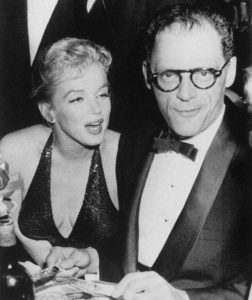
Se også på Socialistisk Bibliotek:
Tidslinjen 17. oktober 1915 om Arthur Miller.
3. juni 1926
Den amerikanske beatgenerations-digter Allen Ginsberg (HOWL and other poems, 1956) fødes i Newark, New Jersey (dør 5. april 1997).

Se:
Allen Ginsberg (Denstoredanske.dk). Kortere leksikal intro.
Allen Ginsberg (Wikipedia.dk). Ditto dansk Wikipedia-artikel.
Howl and Other Poems (Wikipedia.org). Om digtsamlingen.
Litteratur:
Allen Ginsberg: Amerika jeg har givet dig alt og nu er jeg intet: udvalgte digte. Udvalg, oversættelse og forord ved Erik Thygesen (Roskilde Bogcafé, 1997).
Værker:
Howl (i fuld tekst på engelsk) (Poets.org).
Allen Ginsberg Reading Howl (Part 1) (YouTube)
Part II Illustrateted, soundmixed.
Howl (Wikipedia.org)
Howl: Allen Ginsberg and American culture in the 1950s. Review by Kevin Martinez (World Socialist Web Site, 10 December 2010).
Howl. Review by Louis Proyect (The Unrepentant Marxist, September 8, 2010).
Allen Ginsberg’s “Howl”: Fifty years later and in its own time. By Andras Gyorgy (World Socialist Web Site, 5 April 2007).
Om Ginsberg:
‘When Will We End the Human War?’ By Arvind Dilawar (Jacobin, 5 April 2019). “Allen Ginsberg died on this day in 1997. While known for his Beat poetry, he was also indelibly shaped by leftist politics.”
Allen Ginsberg and the ’60s Movement. By Steve Bloom (Against the Current, Issue 184, September-October 2016). Review of Eliot Katz, The Poetry and Politics of Allen Ginsberg (Beatdom Books, 2016, 329 p.).
‘Take that, Maynard G Krebs!’: the beat generation. By Adam Marks (International Socialism, Issue 133, Winter 2012, p.177-198).
Writers revieved: Howling the beat. By David Widgery (Socialist Review, No.81, November 1985).
Chronicle of the Beat Generation. Review article by George Hitchcock (American Socialist, January 1958).
Se:
Dan Turéll: Ginsberg. Del 1 + del 2 (Jørgen Grandts websted).
Allen Ginsberg (1926-1997): a web guide to Allen Ginsberg (Literaryhistory.com; online at Internet Archive).
Allen Ginsberg (Wikipedia.org).
Litteratur:
Allen Ginsberg i Danmark. Af Lars Movin (Spring, 2020, 348 s.)
Beat: på sporet af den amerikanske beatgeneration. Af Lars Movin (Informations Forlag, 2008, 671 sider). Kap.5: Et hyl for frihed – Allen Ginsberg og “Howl”, s.129-160.
San Francisco renaissancen: elleve moderne amerikanske lyrikere. Red. af Erik Thygesen (Sirius, 1964, 103 s.).
Se også på Socialistisk Bibliotek:
Tidslinjen 5. september 1957 om Jack Kerouac’s On the Road.
12. juni 1926
Den danske sociale og socialrealistiske forfatter Martha Christensen fødes i Holsted ved Vejen. (Dør 3. januar 1995 i Svanninge ved Fåborg).
Se:
Martha Christensen (Denstoredanske.dk).
Martha Christensen (Wikipedia.dk). Med links.
Martha Christenen. Af Johannes Fibiger. (Forfatterweb, 2000). Incl. bibliografi, links m.m.
Portræt: Martha – en folkets forfatter. Af Bjarne Nielsen (Arbejderen, 5. januar 20013).
1. juli 1926
Første nummer af Kritisk Revy udkommer. Ansv. red. Poul Henningsen (PH). (Sidste nummer: Hft. 4, dec. 1928).
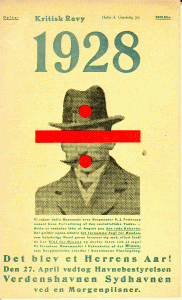
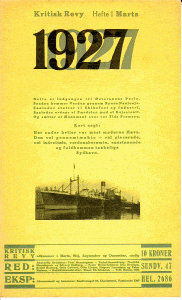
Se:
Kritisk Revy 1927-1928: Danske Kulturtidsskrifter 1917-45. Red.: Det Kongelige Bibliotek (online på Internet Archive)
Se også::
De kulturradikale tidsskrifter – Kritisk Revy. Indskannet fra Morten Thing: Kommunismens kultur: DKP og de intellektuelle 1918-1960 (Socialistisk Bibliotek).
Kulturradikalisme (Danmarkshistorien.dk)
Bevægelsen behandles især ud fra tidsskriftet Kritisk Revy.
Tidslinjen 9. september 1894 om Poul Henningsen.
5. august 1926
Den svenske forfatter Per Wahlöö fødes i Göteborg (dør 23.6.1975 i Stockholm).
Se:
Wahlö, Per (Bibliografi.dk: International Forfatterbibliografi).
Per Wahlöö (Wikipedia.se).
13. august 1926
Fidel Alejandro Castro Ruz fødes i Mayarí, Cuba.
3. december 1976 blev han præsident for Republikken Cuba.
Se:
Castro, Fidel Ruz + Cuba (Leksikon.org).
Se også på Socialistisk Bibliotek:
- Emnelisten: Fidel Castro and Cuba.
- Personlisten: Fidel Castro (1926-2016)
- Personlisten: Che Guevara.
- Emneoversigten: Latinamerika / Latin America
- Emneoversigten: Oprør / Rebellion
15. oktober 1926
Franske filosof Michel Foucault fødes i Poitiers, Frankrig (dør 25.6.1984).
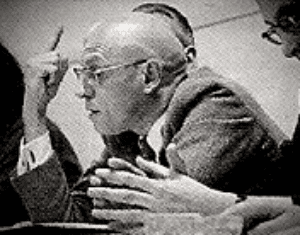
Se:
- Michel Foucault (Leksikon.org).
- Michel Foucault (Wikipedia.org).
- Michel Foucault (Denstoredanske.dk).
Husk nu, at Foucault var fortaler for sex med børn. Af Søren K. Villemoes (Information.dk, 5. april 2018). “Michel Foucault gik ind for en afskaffelse af den seksuelle lavalder, forsvarede pædofili og mente, at tiårige børn opsøger sex med voksne. Det perspektiv mangler i tidens debatter om den franske filosofs værker og eftermæle.” Se også Michael Kjær: Søren K. Villemoes’ pædofilianklager mod Foucault er helt urimelige (Information.dk, 7. maj 2018).
34 år efter Foucaults død har vi forklaringen på hans middelalderlige spiritualitet og støtte til den islamiske oprørsbevægelse i Iran. Af Per Aage Brandt (Information.dk, 2. marts 2018). “… nu 34 år efter hans død dukker der nyt materiale op af arkiverne, der forklarer hans opgør med det vestlige rationalistiske menneske og hans politiske spiritualitet.” Se også: Er Foucault en middelalderlig, skamfuld eller ukritisk tænker?, af Sverre Raffnsøe og Dorthe Staunæs (ibid., 22. marts 2018) + Per Aage Brandts pseudoafsløringer om Foucault falder for et typisk Foucault-kneb, af Dag Heede (ibid., 23. marts 2018; kun online abn.) + Det interessante er, hvorfor Foucault støttede det islamiske oprør i Iran, af Per Aage Brandt (ibid., 6. april 2018; kun online abn.) + Foucault-interview 1979: Foucault og Iran: En åbning mod en bedre verden (ibid., 19. maj 2018; kun online abn.).
Tema: Michel Foucault og sociologiske analyser (Dansk Sociologi, årg. 27, nr.1, 2016, s.5-73). “Med Michel Foucault i marken: Praksis, styring, modstand og magt.”
Michel Foucault (Slagmark, nr.66, 2013, s.7-200). “I dette nummer sætter vi fokus på Michel Foucault som idéhistoriker og hans brug af historien.”
Foucault var nyliberal (Parabol, nr.1, 2023). “Att vänstern anammat Foucaults tänkande har varit fatalt, skriver Johan Söderberg i en ny bok. Nina Björk har läst den och frågar sig varför den makt som arbetarklassen besitter så sällan erkänns.”
Foucault and Neoliberalism as “Left Governmentality” (Verso/Blog, 13 May 2021). An excerpt from The Last Man Takes LSD by Mitchell Dean and Daniel Zamora (Verso Books, 2021, 256 p.). “Mitchell Dean and Daniel Zamora outline Michel Foucault’s growing interest in neoliberalism as a ‘left governmentality’ that could act as an alternative to Marxism.”
How Michel Foucault got Neoliberalism so wrong (Jacobin, September 6, 2019). An interview with Daniel Zamora: “In the emerging neoliberalism of the 1970s, Michel Foucault saw the promise of a new social order, more open to individual autonomy and experimental ways of living. That’s not how things turned out.”
Foucault’s ‘History of Sexuality’: A Marxist engagement (Marxist Left Review, No.14 Winter 2017). “Jordan Humphreys argues that Foucault’s explanation of sexuality under capitalism can be incorporated into a Marxist understanding of sexuality and serve to clarify and enrich it.”
Foucault’s responsibility. By Daniel Zamora (Jacobin: Reason in Revolt, 15 December 2014). “Foucault was not asking the ‘right questions’. And the answers he came up with helped disorient the Left.”
Michel Foucault: friend or foe of the left (International Socialism, Issue 118, Spring 2008, p.155-170). “Colin Wilson puts him in perspective, highlightning his positive contributions, but arguing that they suffer from a confusion of method.”
Foucault and history (Socialist Worker, Issue 2082, 22 December 2007). “The French historian Michel Foucault is enormously influential on the left. Colin Wilson takes a critical look at his ideas and his politics.”
Foucault and the Iranian Revolution: Gender and the Seductions of Islamism (pdf). By Michael J. Thompson (Dissent, Summer 2005, p.20-24). Review of Janet Afary and Kevin B. Anderson’s book (University of Chicago Press, 2005, 346 p.). “It is a book that situates the problems inherent within postmodernism – here specifically in the thought of Foucault – and what the authors refer to as the ‘seductions of Islamism’.” See the book online (pdf) (at Caring Labor).
Foucault and the Iranian Revolution. By Janet Afary and Kevin B. Anderson (New Politics, No. 37, Summer 2004, p.113-122). “The Iranian experience also raises some serious questions about Foucault’s thought.”
Resistance versus emancipation: Foucault, Marcuse, Marx, and the present moment. By Kevin Anderson (Logos, Vol.12, No.1, 2013). “I would like to concentrate on a philosophical orientation that influences contemporary radical movements, centered on the all-too-common preoccupation with notions of ‘resistance’.”
Critique of Foucault on Iran (1993) (pdf). By Maxime Rodinson. Appendix in Janet Afary and Kevin B. Anderson, Foucault and the Iranian Revolution: Gender and the Seductions of Islamism (University of Chicago Press, 2005, p.267-277; scroll down). “A very great thinker, Michel Foucault, part of a line of radically dissident thought, placed excessive hopes in the Iranian Revolution.”
At forsvare sig (Modkraft.dk/Eskil Andreas Halbergs blog, 12. maj 2012). Tekst af Michel Foucault.
17. oktober 1926
Foreningen Aldrig Mere Krig (AMK) stiftes i Helsingør på adressen Møllebakken 2A, som dansk afdeling af Krigsmodstandernes Internationale Forbund, War Resisters’ International (WRI) med hovedkvarter i London.

Se:
- Aldrig Mere Krig (Leksikon.org)
- Aldrig Mere Krig (Wikipedia.dk)
- Aldrig Mere Krig fejrede 75 års jubilæum (Fred.dk)
- Aldrig Mere Krig (site)
- Aldrig Mere Krig (Facebook-side)
20. oktober 1926
Den amerikanske socialistleder Eugine V. Debs dør i Elmhurst, Ill. Født i Terre Haute, Indiana, 5. november 1855, se denne.
8. november 1926
Generalsekretæren i Italiens Kommunistiske Parti (PCI) Antonio Gramsci arresteres af det fascistiske politi.
Skriver fra 1929 “Fængelsesoptegnelser”. (Født 22.1.1891 (se denne), i Arles på Sardinien, dør 27.4.1937 i Rom).
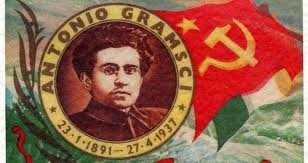
Se:
Antonio Gramsci’s Prison Notebooks, 1929-1935 (Marxists Internet Archive).
Fængselsoptegnelser – Bidrag til marxismens teori og historie. Af Antonio Gramsci (Marxisme Online (uddrag på dansk).
Se også på Socialistisk Bibliotek:
Personlisten Antonio Gramsci (1891-1937)
















